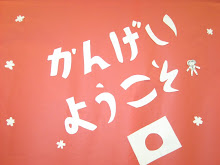Wednesday, December 2, 2009 A Block Two Day
!!!***Attention***!!!
Sixth Annual Chicago Taiko Legacy
Sunday December 27, 2009
Chicago Cultural Center
78 E. Washington Street, Chicago, IL 60602
3 to 5 p.m. Free Admission
Websites:
www.tsukasataiko.com
www.taiko.legacy.com
JAPANESE 3 -- First period
This class does not meet on Block Two days.
JAPANESE 2 -- Sixth period
We went over yesterday’s test. Results were much better. There appear to be two reasons if people did not do well:
1. lack of understanding of concepts of different conjugations of types of adjectives (put “great” on board in all 4 forms)
すごい です、
すごくない です、
すごかった です (NEVER でした)、
すごくなかった です(NEVER でした)。
2. lack of explicit vocabulary study Everything was on blog last night, and I told you it was there, so if you made lots of mistakes, it means you made no effort
Handout from Nakama for practicing sentences about weather.
Homework is to do page 27 in workbook, writing material in rectangle in English on a separate piece of paper, and filling in the map with the proper symbols
Your weather project posters will be due on Monday
review categories
times: this week、last week、today、tomorrow
こんしゅう、せんしゅう、きょう、あした
一月、二月、Etc.
一時(いちじ)、二時、Etc.
school subjects
すうがく、おんがく、たいいく、しゃかい、れきし、かがく、えい語、日本語
places like library
としょかん、ともだち の うち、まち、こうえん、くうこう、レストラン、こうてい、きょうしつ、えいがかん、たいいくかん、高校(こうこう)、こうこう、がっこう、小学校(しょうがっこう)、中学校(ちゅうがっこう)、大学(だいがく)
countries, nations
ドイツ、オーストラリア、フランス、いぎりす、アメリカ、カナダ、インド、インドネシア、バヌアツ、イタリア
i adj
すごい、つまらない、あたらしい、大きい(おおきい)、小さい(ちいさい)、うるさい、きたない、すごい、たのしい、おもしろい
classroom obj
えんぴつ、いす、つくえ、こくばん(ホワイト・ボード)、まど、ドア、ふでばこ、ものさし、けしゴム
sports and activities with shimasu
スポーツ を します、かいもの します、さんぽ します、じょうば します、キャンピング します、すいえい します、
getting ready for weather poster – part of 2 Kimono Chapter 3
Choose a city – everyone must have a different city
a week forecast Dec 13 to 20
use Celsius temperatures
さいこう きおん Highest temperature
さいてい きおん Lowest temperature
でしょう = Is, probably (a way of doing uncertain future tense)
JAPANESE 4 and AP – Seventh period
Jerome M. and Amy Z. gave their oral presentations on Japanese holidays, flower-viewing and becoming-an-adult-day.
The following week, Mike S. and Anton H. will present. The week before Christmas break Connie Y. and Lalita A. will speak. The week after Christmas break, the speakers will be Elizabeth A. and Tommy Y.
Re-iterating AP speaking assignment:
日本との出会い:第三、四課
APの祭り(まつり)の 発表(はっぴょう)
1. 好きな 日本 の まつり を 選びなさい(えらびなさい)。
2. まつり の 名前 を 先生 に 教えなさい(おしえなさい)。
3. インターネット や 本 や ざっし で 調べなさい(しらべなさい)。
4. カード で みじかい ノート を 書きなさい。
5. あたらしい ことば の リスト を 作って みな に 出しなさい(だしなさい)。
6. ノート を 見ながら、みな に まつり の こと を 話なさい。
長さ: 五つ の 段落(だんらく)、三分
Practice your speech so that you can speak comfortably and clearly and with a natural rhythm. Before speaking, you must hand out a list of unfamiliar vocabulary so that everyone can understand your speech. This assignment will be graded as an oral performance, not as a written project. The other students will take notes as you speak and will contribute to the evaluation. You will hand in the (legible) notes (information items, not sentences) to Sensei at the end of your speech. You will see a rubric for speeches/presentations on the other side of this page. Thinking about these criteria will be useful when getting ready to talk about the matsuri you have chosen.
Alexander Hana-matsuri
Amorntheerakul Japanese Valentines Day
Harrington Green Day?
Molasky O-hanami
Sarchet Undo-kai
Yan Tanabata
Yu O-Shougatsu
Zhuang Seiji no Hi
Grammar hand-out for using verb-stem + nagara from workbook for 2 Nakama, pages 94 and 95.
Grammar handout on combining sentences:
日本との出会い:第三課 Combining Sentences
1. A.高山(たかやま)に 行く。 B.お城(しろ) を 見る。
2.A. 中国(ちゅうごく)の レストラン に いる。 B・とうふ を 食べる。
3.A.ラジオ を 使う(つかう)。 B.きれいな 音楽 を 聞く。
4・A. パリ に いる。 B. ワイン を 飲む。
On a separate piece of paper that you will hand in, combine each A - B pair above into one sentence. Make necessary adjustments to verb tenses. Translate each resulting A – B complex or compound sentence into English. Use the following items and patterns:
一.A 時 B: WHEN (a specific point in time) A, B
二.A と B: WHENEVER A, (always, inevitably) B
三.A から (ので) B: A THEREFORE (SO) B
四.A けれども (が)B: A HOWEVER (BUT) B
五.B ため に A IN ORDER TO: In order to B, A
The result will be a total of 20 sentences in Japanese and 20 sentences in English.
(First set was projected on board as a model)
More sentence combining work will take place on Friday. Start getting ready for vocab test on chapter 3 of Nihon to no Deai, everybody.
AP people should be getting ready for kanji test on 2 Nakama chapter 2.
We will work soon on independent dialogue between guide and tourist being shown around a location.
About Me

- O.Kimeru
- M.A. 1992 from U. of Chicago; Japan Foundation Fellow in 1987-88; research fellow Yokohama City University; Japanese language teacher since 1991; also taught French (member American Association of Teachers of French), English as a Second Language (to students), methodology of teaching ESL (to Japanese high school teachers), English, Japanese history/culture, drama; in 2002 and 2004, listed in Who's Who Among America's Teachers; member of Chicago Sister Cities Osaka Committee, and chair of its Education Sub-Committee; vice-president Illinois Association of Teachers of Japanese; Payton H.S. World Language Department Chair from 2003-2007, under founding principal Mrs. Gail Ward; taught Japanese and coordinated Japan Exchange at Payton from 2003 to 2010; Japanese teacher at Burr Public School beginning August, 2010
Followers
Blog Archive
-
▼
2009
(146)
-
▼
December
(11)
- December 17, 2009 An Eight Period Day
- December 16, 2009 A Block Two Day
- December 15, 2009 A Block One Day
- December 14, 2009 An Eight Period Day
- December 11, 2009 An Eight Period Day
- Wednesday, December 9, 2009 A Block Two Day !!!...
- December 8, 2009 A Block One Day
- December 7, 2009 An Eight Period Day
- December 4, 2009 Friday An Eight Peri...
- December 2, 2009 A Block Two Day
- December 1, 2009 A Block One Day
-
▼
December
(11)